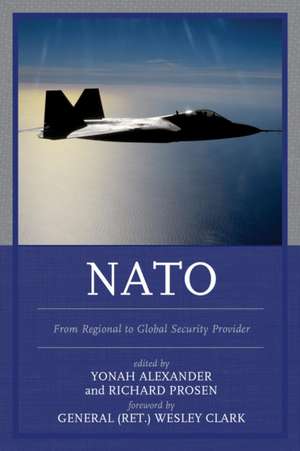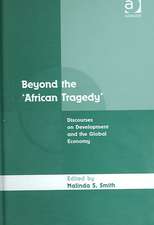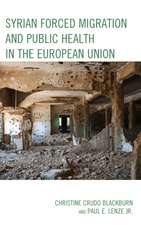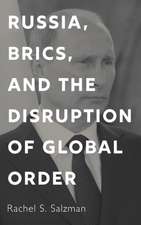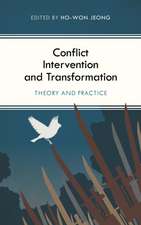NATO FROM REGIONAL TO GLOBAL SPB
Autor Alexanderen Limba Engleză Paperback – 17 iul 2017
Preț: 476.46 lei
Nou
Puncte Express: 715
Preț estimativ în valută:
91.17€ • 95.19$ • 75.46£
91.17€ • 95.19$ • 75.46£
Carte tipărită la comandă
Livrare economică 05-19 aprilie
Preluare comenzi: 021 569.72.76
Specificații
ISBN-13: 9781498503709
ISBN-10: 1498503705
Pagini: 308
Dimensiuni: 152 x 229 x 23 mm
Greutate: 0.5 kg
Editura: Rowman & Littlefield
ISBN-10: 1498503705
Pagini: 308
Dimensiuni: 152 x 229 x 23 mm
Greutate: 0.5 kg
Editura: Rowman & Littlefield
Notă biografică
Yonah Alexander is Professor Emeritus and former Director of the Institute for Studies in International Terrorism at SUNY.
Richard Prosen is resources, reform, and transnational threat coordinator in the Department of State¿s Office of European Security, Political, and Military Affairs (EUR/RPM).
Cuprins
Introduction: Yonah Alexander and Richard Prosen (editors)
Part I: Horizontal Security Challenges: Emerging Security Challenges and Threats
Chapter 1: Asymmetric Threats and New Security Challenges Natividad Carpintero-Santamaria (General Secretary, Institute of Nuclear Fusion)
Chapter 2: NATO¿s Cyber Decade?
R. David Edelman (Director for Cyber Policy, National Security Staff)
Chapter 3: Counter-Piracy
Carrie Shirtz (Political Military Officer, Office of European Security and Political Affairs, U.S. Department of State)
Chapter 4: The New NATO Policy Guidelines on Counterterrorism: Analysis, Assessment, and Actions
Stefano Santamato (Senior Visiting Research Fellow, Institute for National Strategic Studies at the National Defense University) with Marie-Theres Beumler (European Peace University)
Part II: Vertical Security Challenges: National, Regional and Operational
Chapter 5: NATO and the Balkans: From Intervention to Integration
Raffi Gregorian (Director, Peace Operations, Sanctions and Counter-terrorism Office, U.S. Department of State)
Chapter 6: Operation Unified Protector: Prospects and Challenges for NATO's Role in Global Security
James Henry Bergeron (Political Advisor, Striking Force NATO/U.S. Sixth Fleet)
Chapter 7: NATO and Afghanistan: Partnership and Setbacks
Richard Weitz (Senior Fellow, Hudson Institute)
Part III: NATO¿s Assets and Capabilities
Chapter 8: Capabilities Development and Common Funding
George Sinks (Program Manager, LMI)
Chapter 9: NATO¿s Ballistic Missile Defense
Michael Ziemke (Office of Policy and Regional Affairs, Bureau of European and Eurasian Affairs, U.S. Department of State) and Paul Dodge (Office of the Secretary of Defense)
Part IV: NATO: Quo Vadis?
Chapter 10: NATO-Russia Relations: Ukraine and Other Unfinished Business
Patrick Murphy (Inter-University Center for Terrorism Studies)
Chapter 11: The Changing Parameters of the Transatlantic Security Relationship: The Case of Afghanistan
Georgiana Cavendish (U.S. Department of State)
Chapter 12: Partnership for Peace Consortium: An Innovative Approach to Defense Education and Institution Building
Raphael Perl (Executive Director, Partnership for Peace Consortium) and Enrico Mueller (Deputy Executive Director, Partnership for Peace Consortium)
Chapter 13: NATO Partnerships into the Future
Leslie Ordeman (Spokesperson at the U.S. Consulate General in Jerusalem) and Bruce Weinrod (Former Secretary of Defense Representative for Europe and former Deputy Assistant Secretary for European and NATO Policy)
Chapter 14: NATO as a Security Exporter: Resourcing Capabilities and Capacity to Shape and Protect NATO¿s Global Interests
Derrick J. Busse (Potomac Institute for Policy Studies)
Chapter 15: Summary and Conclusions Yonah Alexander (Inter-University Center for Terrorism Studies)
Bibliography
Descriere
The book serves as a relevant and timely study of the most pressing issues facing NATO today - including recent lessons gained. It provides recommendations for consideration and further discussion (i.e., the "what" and the "how" regarding future policy options for the North Atlantic Alliance).
